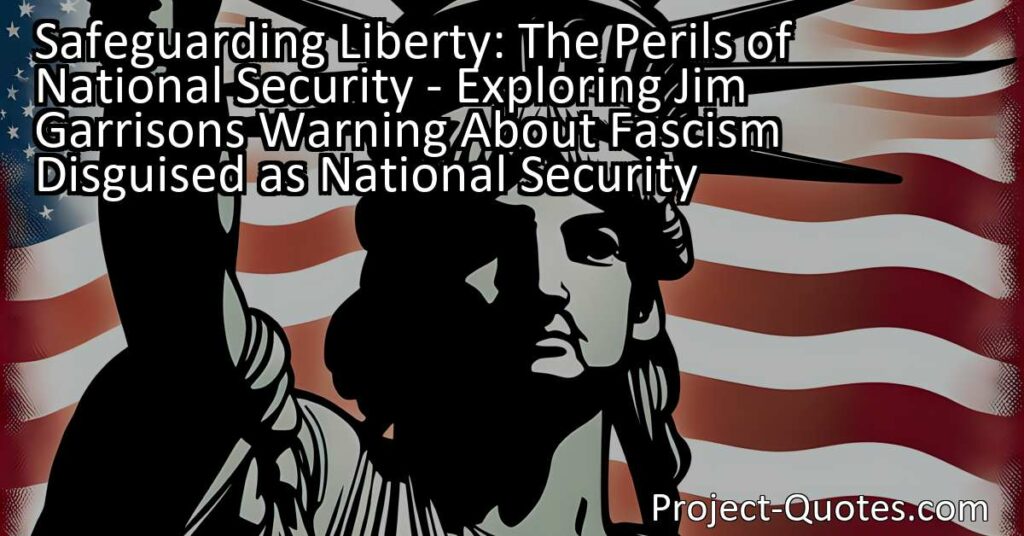I’m afraid, based on my own experience, that fascism will come to America in the name of national security.
Jim Garrison
Safeguarding Liberty: The Perils of National Security – Exploring Jim Garrison’s Warning About Fascism Disguised as National Security Jim Garrison, an American author, raised concerns about the potential threat of fascism infiltrating national security measures. By analyzing historical events that encroached on civil liberties, such as the internment of Japanese-Americans during World War II and the enactment of the Patriot Act after 9/11, we can understand the delicate balance between security and individual rights. It is crucial for citizens to remain vigilant and protect our democratic values to prevent the erosion of freedom under the guise of national security.
Table of Contents
Meaning of Quote – I’m afraid, based on my own experience, that fascism will come to America in the name of national security.
Safeguarding Liberty: The Perils of National Security
Introduction :
In today’s world, discussions around national security and its potential implications are more pressing than ever. As prominent American author Jim Garrison once remarked, he feared that fascism might emerge disguised as national security measures. In this article, we will explore Garrison’s thought-provoking quote and delve deeper into the concept of national security. By examining historical events and understanding the fragility of civil liberties, we can better comprehend the significance of Garrison’s warning and the importance of safeguarding our freedoms.
Understanding National Security :
Before we analyze the potential threat of fascism concealed as national security, it is crucial to comprehend the meaning of national security itself. National security refers to protecting a country’s sovereignty, its citizens’ well-being, and its interests from internal and external threats. It entails various measures such as military defense, intelligence gathering, border control, and counter-terrorism efforts. However, throughout history, some national security actions have strained our democratic values and civil liberties, leading individuals like Jim Garrison to raise concerns about their potential abuse.
A Historical Perspective :
To understand the context surrounding Jim Garrison’s remark, we must analyze historical events where national security measures have encroached on civil liberties. One such instance is the internment of Japanese-Americans during World War II. In response to fears and prejudices following the attack on Pearl Harbor, approximately 120,000 innocent Japanese-Americans were forcibly relocated to desolate internment camps. This gross violation of civil liberties, justified in the name of national security, serves as a sobering reminder of how easily the line between safeguarding citizens and infringing upon their rights can blur.
More recently, the tensions following the September 11, 2001 terrorist attacks prompted the establishment of the Patriot Act in the United States. While this legislation aimed to enhance national security by expanding surveillance tools and intelligence-gathering capabilities, it inevitably encroached upon individual privacy rights. The balance between security and liberty became increasingly delicate, calling into question the extent to which the government should infringe upon citizens’ rights in the name of national security.
The Potential for Fascism :
Jim Garrison’s concern that fascism could creep into American society under the guise of national security is a valid reflection on our current political landscape. Fascism, characterized by authoritarian rule, censorship, suppression of dissent, and an all-powerful central government, poses a grave threat to democratic values. History bears witness to the rise of fascist regimes, emphasizing the need for eternal vigilance against such ideologies.
When considering nationalism, a key component of fascism, it is essential to distinguish between a healthy sense of patriotism and an exclusionary fervor that exacerbates societal divisions. National security measures should never cultivate an “us vs. them” mentality, as this only serves to erode the fabric of our diverse society and sow the seeds of distrust.
Furthermore, a fundamental aspect of fascism is the undermining of civil liberties and individual rights. When national security takes precedence over these foundational pillars of democracy, it places us on a slippery slope towards the suppression of dissenting voices, loss of privacy, and erosion of due process. This gradual erosion, justified under the banner of national security, chips away at the very essence of democracy, leaving it vulnerable to more egregious abuses of power.
Conclusion :
In his prescient remark, Jim Garrison cautioned against the potential convergence of fascism and national security measures. As responsible citizens, it is paramount that we remain vigilant and actively safeguard our democratic values. By striking a delicate balance between national security and individual rights, we can ensure that the sacrifices made to protect our nation do not undermine the values upon which it was built. In this way, we can fortify ourselves against the sinister encroachment of fascism masked as national security.
I hope this quote inspired image brings you hope and peace. Share it with someone who needs it today!


